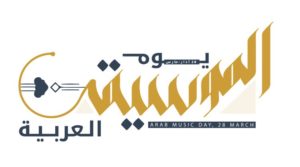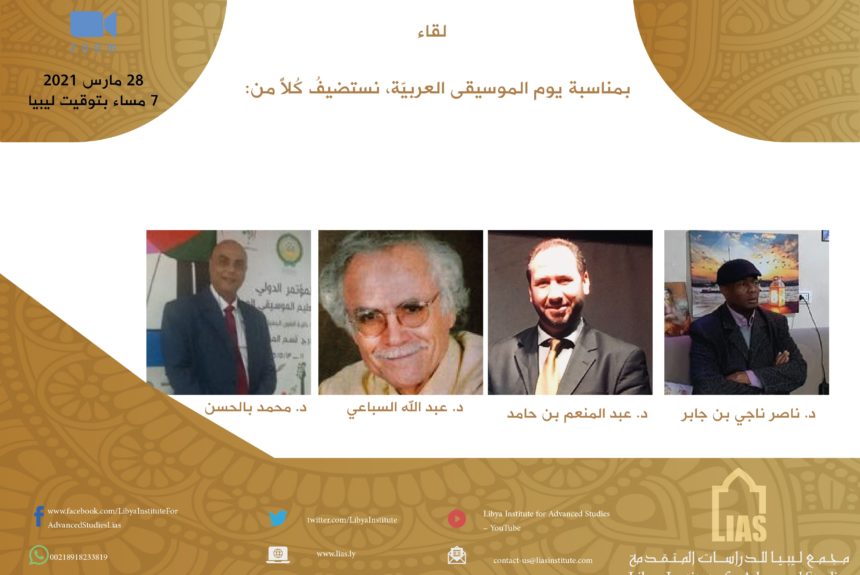The Libya Institute for Advanced Studies organized a discussion panel on the Zoom platform on the occasion of Arab Music Day, which fell on Sunday, March 28, 2021, which is held on March 28 of each year.
A group of professors and experts participated in the meeting, including:
Mr. Dr. Abdullah Al-Sibai Chairman of the Traditional Heritage Music Committee of the Arab Music Academy, and representative of the State of Libya on the Executive Council of the Academy.
Dr.. Muhammad Belhassan is a faculty member at the University of Benghazi, Faculty of Science, Department of Physics, specializing in Acoustics and Waves.
Dr.. Abdel Moneim Bin Hamed is a faculty member in the Department of Musical Arts at the Faculty of Arts and Media, University of Tripoli
Dr.. Nasser Naji bin Jaber, President of the Syndicate of Musical Professions, and a faculty member in the Department of Musical Arts at the Faculty of Arts and Media, University of Tripoli.
Dr. presented. Abdullah Al-Sibai talked about Arab Music Day, and that at the initiative of the Arab Music Academy (League of Arab States), the call comes to celebrate Arab Music Day on the twenty-eighth of March every year, which is the date that in 1932 witnessed the opening of the first Arab Music Conference, hosted by Cairo at the time. That day, in addition to the most prominent musicians in the Arab world, it was attended by major music scholars who were fascinated by this music and its rich and diverse heritage. Throughout the days of the conference at that time, the subject of Arabic music was discussed, focusing on its history, theories, terminology, score, maqams, and rhythms. The meeting lasted for two weeks, and was published in a very large book, containing in its pages all the conversations and discussions that took place regarding Arabic music.

The idea of the annual celebration was taken up by the Academy with the aim of keeping the high quality of this music alive in the memories of connoisseurs, intellectuals and younger generations, and highlighting the need to pay attention to it culturally, educationally and socially.
It should be noted that the Council of the League of Arab States, at the ministerial level, agreed to consider March 28 of each year as a day to celebrate Arabic music (Resolution No. 8372, dated 3/6/2019).
http://www.leagueofarabstates.net/ar/events/Pages/ArabicDaysDetails.aspx?RID=32
The panel discussion touched on the reality of Arabic music at the present time, and the problems it faces: legal, legal, intellectual property, regulatory, and governmental, the reality of the closure of “Gregorian” and “Sha’ali” music institutes, the reality of school curricula, the importance of documenting and digitizing melodies and notes, and the history of music. Composers, artists, and authors, the role of Sufi zawiyas in developing and preserving musical melodies, and the roles assigned to the artist, the union, and the government in preserving, developing, and introducing the identity of Libyan music to the world.
The discussion also referred to Arabic music and digitization, achievements, reality, ambitions and difficulties, the issue of education with music, the educational curricula “music education” and its current reality, and the problems of not training professors for this subject.
The importance of the role assigned to the Musical Professions Syndicate in submitting proposals, draft laws, and documentation projects for melodies, scores, creators, and artists, and working to issue a list of stolen works and the entities and persons who stole them.
At the conclusion of the meeting, the Libya Academy extended an open invitation to research professors to print their books and documentary works within the publications of the Libya Academy for Studies, while making the Libya Academy’s platform available on Zoom for lectures, seminars and meetings related to music and artists.
To watch the full meeting here


